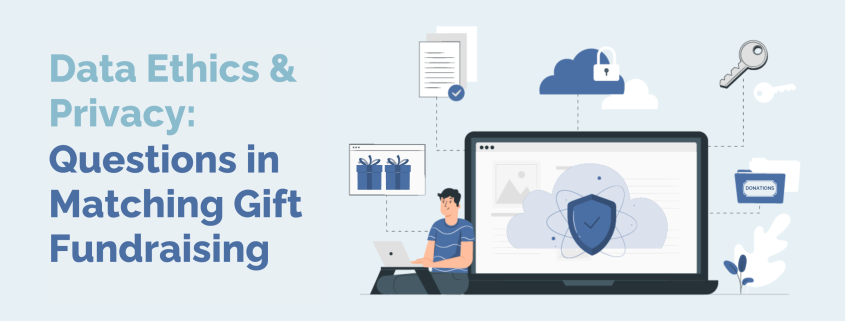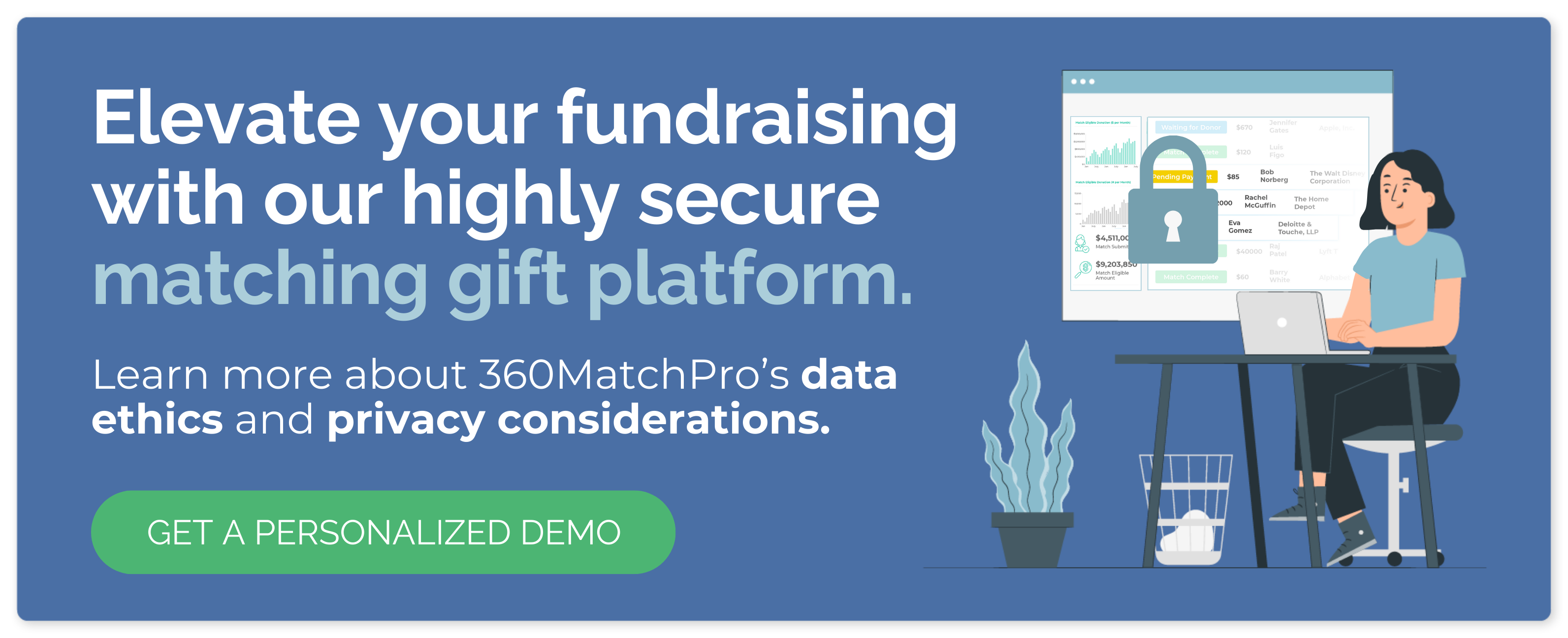Data Ethics and Privacy: Questions in Matching Gift Fundraising
Data is a powerful resource for making strategic decisions. This idea is evidenced by McKinsey Global Institute’s claim that organizations backed by innovative data practices are 23 times more likely to acquire donors, consumers, and other essential stakeholders. In many ways, data has been established as a new currency in an information-driven era.
As increased data collection becomes the norm in fundraising (and, specifically, matching gift fundraising), it’s imperative to consider the ethical implications of any information management practices. Organizations must address how they collect, store, and use their data in a way that preserves individual rights and sustains public trust.
And we’ll help you walk through the process of doing so! In this guide, we’ll cover everything you need to know about data ethics and privacy in matching gift fundraising:
Remember: trust and transparency go a long way when it comes to building a positive reputation with your intended audience. You certainly don’t want to miss out on supporter engagement—including individual donations and corporate matching gifts—due to a sense of wariness surrounding your organization’s data management efforts. So let’s jump in!
What is data ethics, and why is it important?
Before we dive into specific tips and practices, it’s crucial that we establish the fundamentals.
Data ethics describes the moral principles or guidelines governing data collection, handling, analysis, and use.
These guidelines ensure organizations handle data responsibly and ethically to protect sensitive information and maintain public trust.
As more organizations rely on data-driven decision-making in fundraising and other activities, they must consider how they can protect themselves and their constituents from harmful data leaks, hackers, and internal biases. This concern is especially relevant in the age of artificial intelligence (AI) and machine learning, where unchecked data use can have significant societal consequences.
Organizations with a reputation for ethical data management cultivate greater trust among their supporters, customers, employees, and stakeholders. This sense of trust opens the door to increased collaboration and innovation within their industry. And, even though data ethics is an evolving concept, organizations prioritizing it will continue to differentiate themselves from competitors.
What are the guiding principles of data ethics?
Data ethics covers a variety of principles to promote beneficial data use while safeguarding against potential harm that might arise from misuse. These principles include:
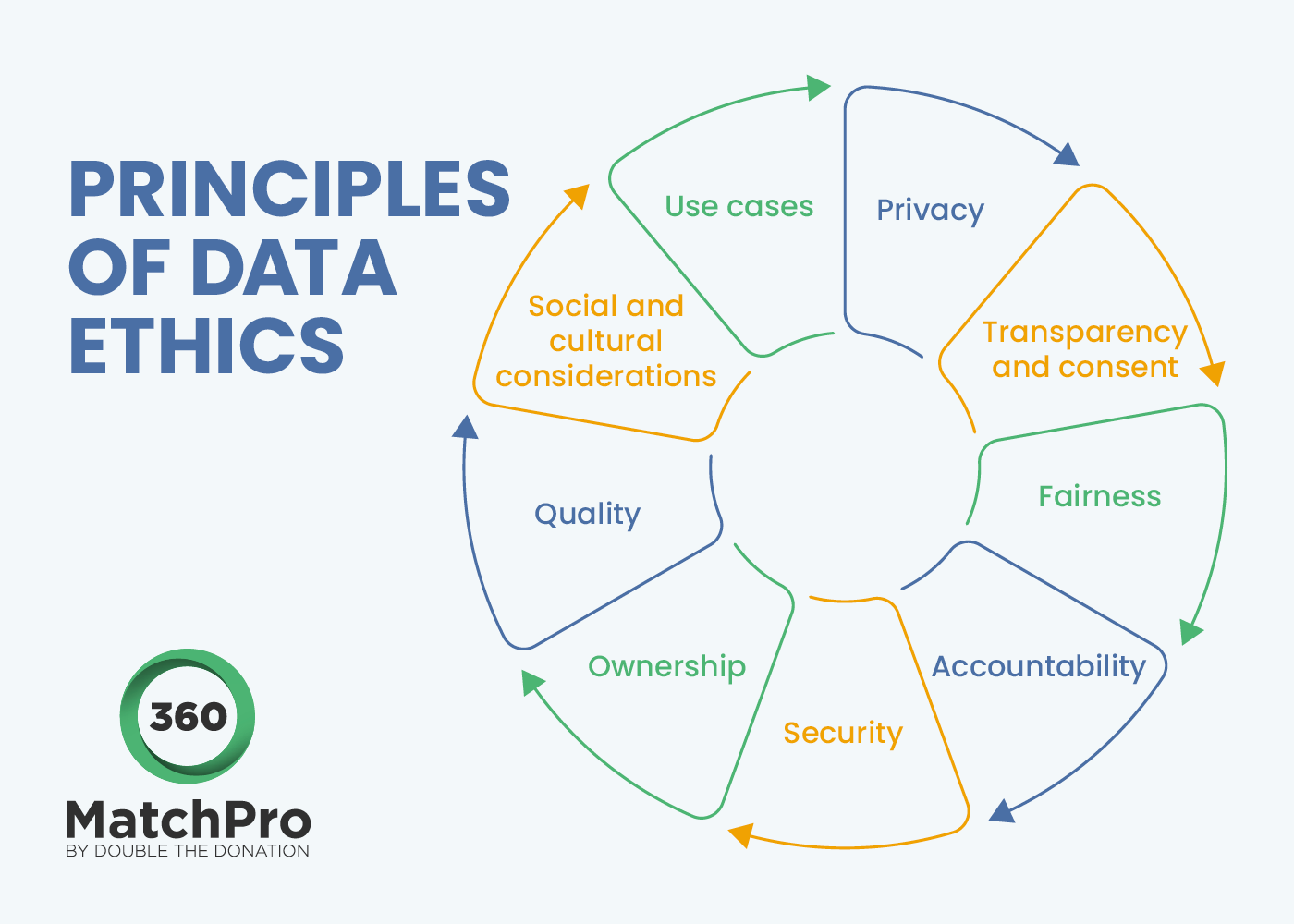
Privacy
Organizations must collect and use data in ways that comply with individual rights to personal information. For example, healthcare payers must protect their policyholders’ private personal health information.
Transparency and consent
There’s also a responsibility to clearly state how data will be collected, processed, and used. This way, individuals can make informed decisions about their personal information and provide voluntary consent.
Fairness
This measure ensures data analysis and decision-making do not discriminate against specific individuals or groups based on factors such as race, gender, or socioeconomic status.
Accountability
Organizations and individuals responsible for managing sensitive data must be held accountable. That’s why there are laws like HIPAA and GDPR for addressing data breaches, data leaks, or other unethical data-related activities.
Security
Robust security measures are a necessary protocol to keep data secure and protected against unauthorized access, breaches, and cyberattacks. These measures include ensuring both hardware (computers, hard drives, mobile devices, etc.) and software (donation tools, matching gift solutions, peer fundraising platforms, event management systems, and more) are secure and up to date.
Ownership
Ownership clarifies the specific rights and responsibilities of individuals and organizations concerning their data. For instance, many nonprofits implement role-based CRM access controls.
Quality
Data quality must be kept hygienic for ethical analysis and decision-making. Duplicate, inaccurate, or incomplete data can mislead organizations and cause harm to customers or stakeholders.
Data use cases
These refer to the implications of specific data use cases such as identifying matching gift fundraising opportunities, predictive analytics, population health management, or donor data use within separate industries like healthcare, criminal justice, or the nonprofit sector.
Social and cultural considerations
Data ethics can vary across different cultures, industries, and societies. That’s why organizations must consistently review new legislation to ensure that their systems are compliant.
Not to mention, as new technology continues to emerge, it’s an organization’s job to ensure that they implement compliant software systems. For example, healthcare analytics platforms must account for new data validation standards to minimize inaccurate medical information.
What is the impact of data ethics on matching gift fundraising?
Corporate matching gifts provide a powerful source of nonprofit fundraising revenue. But as the process is a multi-step one that typically spans more than one online system and engages numerous stakeholders, you might end up introducing some vulnerabilities if you’re not careful.
As with any aspect of a well-thought-out fundraising strategy, it’s critical for nonprofits to maintain effective and ethical data practices as they seek employee matching gifts. After all, maintaining your donors’ trust is paramount for any organization, and data ethics can play a crucial role in establishing and preserving this assurance.
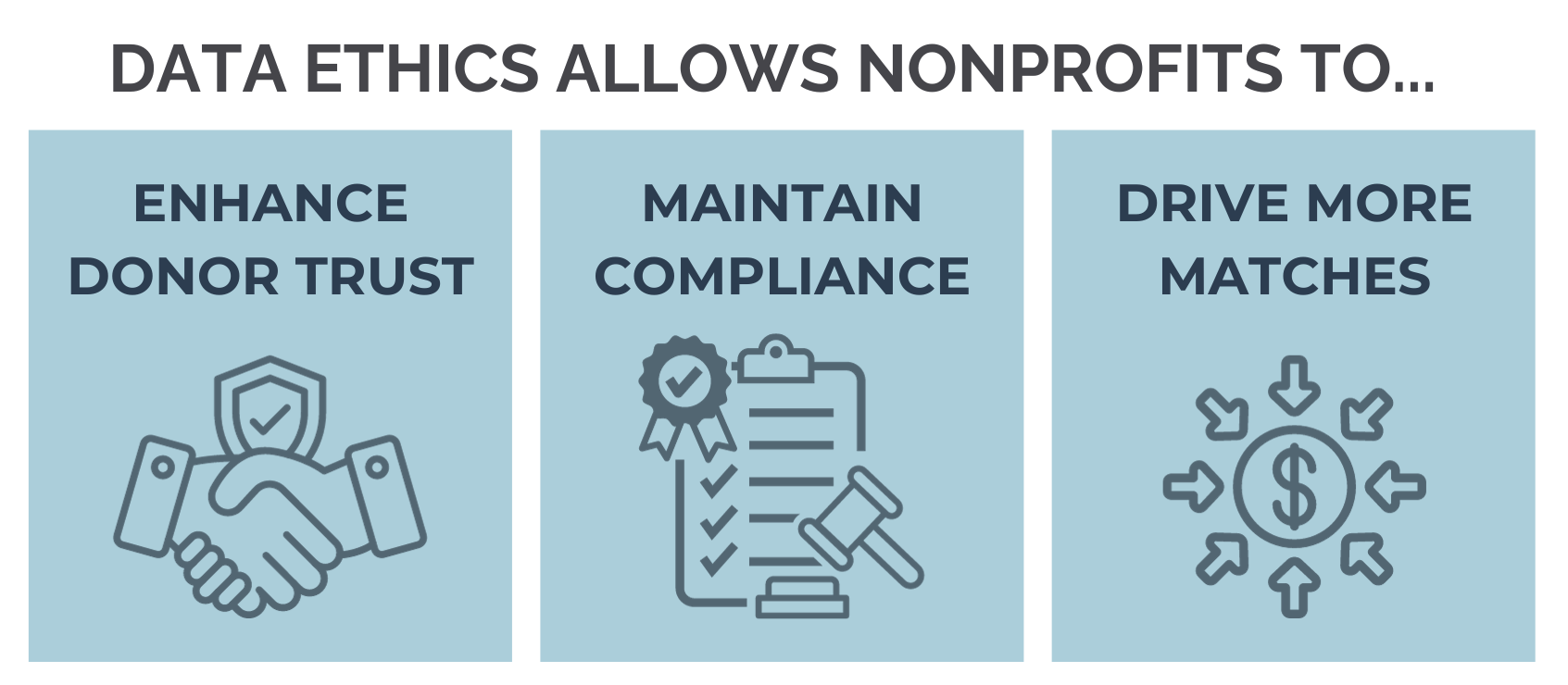
Donors are more inclined to support nonprofits financially and by requesting matching gifts when they feel the organization prioritizes the privacy and security of their data. They’ll also be more likely to continue supporting the organization. More gifts plus more match requests equal more funding for your mission.
Not to mention, disregarding data privacy regulations can put your organization in costly legal trouble. That’s the opposite of what matching gift fundraising aims to do!
How can organizations safeguard sensitive information?
Organizations must proactively protect sensitive information to remain compliant and build trust among their stakeholders. Every industry comes with specific data regulations and policies, but as a general rule of thumb, here are some top strategies you can use to safeguard vulnerable data:
- Strive for minimization of data. Organizations should only collect the necessary information to avoid burdensome data loads that can slow processes and overwhelm underdeveloped systems. That said, if your organization requires a large data volume, use reliable integration processes that enrich data without sacrificing security.
- Develop comprehensive internal guidelines. Outline data use policies, sharing expectations, access and permissions, software credential management, and stewardship responsibilities. For example, a nonprofit may designate a specific department as responsible for donor data supervision.
- Use robust security measures. Access control, encryption, and network security are all mechanisms you can use to maintain ethical data management. Look for technology with these built-in measures, and consider implementing additional physical security measures to protect physical access.
- Perform regular audits. According to NPOInfo, a data audit is “a critical review of your organization’s data collection process.” This process includes mapping your data’s journey and identifying any vulnerabilities. Use this opportunity to locate suspicious activity and update access controls as needed.
- Train your staff. Consider offering mandatory security training for newly onboarded employees. Ensure all staff can identify and report suspicious activity and improve system vulnerabilities. If needed, consider bringing in experts to explain new security protocols or best practices. This way, you’ll foster a culture of ethical data handling.
Organizations that regularly handle large volumes of sensitive data may also consider developing an incident response plan in the case of a data breach. This plan would include notifying affected individuals as per data protection regulations.
How can companies ensure ethical data practices with employee giving tools?
On the other side, maintaining data integrity as a business can be just as important—especially regarding your employees’ personal information. One instance where this might be relevant is with the CSR management software your team members use to participate in matching gifts and other workplace giving opportunities.
When an employee gives, their sensitive data (including transaction details) are passed into your system in order to review and approve the request. So it’s important that you don’t let that information fall into the wrong hands!
Your company has likely invested a lot of time and resources into your corporate philanthropy programs with the aim of engaging employees, improving your public image, and giving back to your community at the same time. But you’re not likely to reach any of those goals with poor data ethics.
Thus, make a point of clearly communicating to employees how the CSR software collects, stores, and leverages their information. Transparent communication fosters trust and ensures that employees are aware of (and consent to) how their data is being used.
Plus, you’ll want to confirm that the software platform you choose to facilitate your giving programs is one that is serious about data protection! If the solution integrates with other fundraising or giving tools (such as with Double the Donation’s auto-submission functionality), ensure it does so in a way that is ethical and secure. This not only establishes safeguards regarding individual privacy but also reinforces the company’s commitment to responsible data management!
How does 360MatchPro protect matching gift donor data?
360MatchPro by Double the Donation is the nonprofit and education sectors’ leading matching gift solution, enabling fundraisers to automate the identification and outreach to match-eligible donors with ease. Because it does so by accessing an organization’s donation records, it’s crucial that the tool is devoted to the highest levels of data privacy.
These are just a few of the steps we’ve taken to maintain ethical data practices, ensuring we protect our clients’ and their donors’ sensitive information:
Encryption — All data flowing into and out of your matching gift platform is safeguarded with best-in-class encryption in transit, advanced TLS (Transport Layer Security) protocols, and 2,048-bit keys.
Firewalls — Donor data is protected with a number of digital security measures, including an enterprise-grade web application firewall and a tightly controlled network-level firewall.
Vulnerability assessments — Our team runs regular vulnerability assessments in order to locate and address any security concerns in a timely manner. This includes dynamic application scans, static code analysis, infrastructure vulnerability scans, penetration testing, and more.
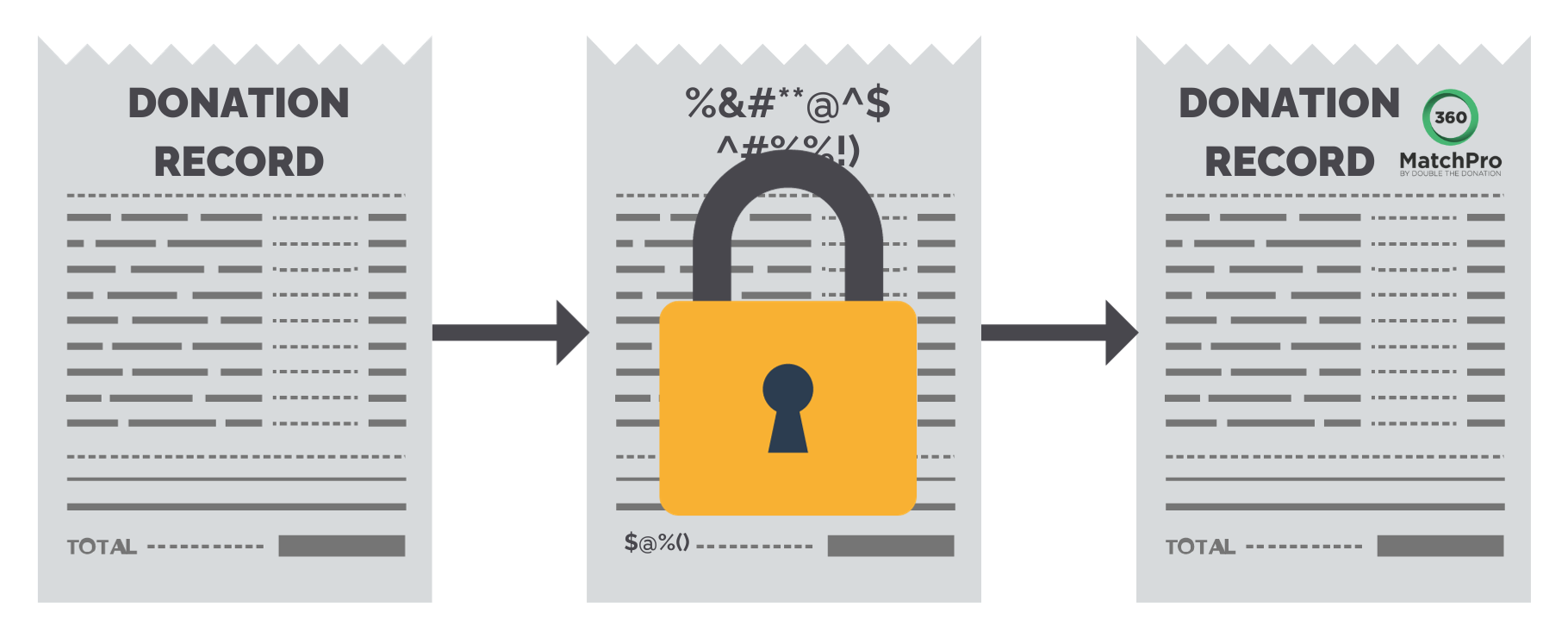
Together, these efforts allow us to produce a complete automation system that benefits matching gift fundraising and maintains effective and ethical security efforts. Our tools even adhere to GDPR standards (or the European Union’s General Data Protection Regulation)!
Learn about even more security practices we’ve established in our Knowledge Base.
Wrapping Up
Embracing and adhering to data ethics in every aspect of your organization’s operations will not only keep your team out of legal trouble. It can also differentiate you as a mindful and socially responsible party going beyond compliance requirements. By following data laws and regulations, you’ll help establish transparency and build trust in your organization by communicating to your audience that their privacy is a top priority.
Meanwhile, as new processes and technologies arise, it’s important to ensure the tools you incorporate align with your dedication to data privacy as well. This will reinforce your commitment to safeguarding donor information and maintaining the highest standards of integrity in fundraising and mission-related endeavors.

